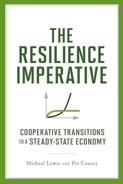Ressources
 With so many books being written about peak oil, climate change, and their implications for our people and planet, what’s different about The Resilience Imperative : Co-operative Transitions to a Steady-State Economy ? Its central thesis is that climate change and escalating energy prices compel us to reinvent our economic life on a much more local and regional basis. But how to do it ? This is the vexing question. How do we forge a steady-state economy that is socially, ecologically and economically sensible and sustainable ? Is it even possible, or just the naive notion of do-gooders ?
With so many books being written about peak oil, climate change, and their implications for our people and planet, what’s different about The Resilience Imperative : Co-operative Transitions to a Steady-State Economy ? Its central thesis is that climate change and escalating energy prices compel us to reinvent our economic life on a much more local and regional basis. But how to do it ? This is the vexing question. How do we forge a steady-state economy that is socially, ecologically and economically sensible and sustainable ? Is it even possible, or just the naive notion of do-gooders ?
The Resilience Imperative resonates with the possible ! Using a range of theory and incisive historical and contemporary analysis for a launchpad, it presents case after case of creative, strategic action in the world of today. These strategic pathways demonstrate how people in Asia, Europe and North America are learning to meet basic needs for food, land, housing, energy, and finance more locally and regionally. Their example shows how we too might navigate transition and strengthen resilience where we live. Powerfully, the authors bring these innovations back down to earth by revealing the implications, in dollars and cents, for the cost of living of the average household.
By defining connections more vividly and obstacles more clearly, this book helps readers see just what we can unleash once we put our shoulders to the common weal of innovation – locally, regionally, nationally, and globally. We can take on the status quo, practically and politically. Moreover, co-operatives, trusts, and the social economy are crucial to scaling up these innovations and powering down our economic lives to something sensible and sustainable.
Download pre-released excerpts !
- Kirklees, U.K. : An area-based approach to to energy efficiency, housing affordability, and jobs
- Sweden’s JAK Bank : Liberating Community Finance from the Ball and Chain of Compound Interest -*Towards Fair Trade Banking : A Journey From Market Freedom To Mutual Liberty -* Affordability Locked In : Community land trusts – good news for households, communities, & taxpayers
- The Best of Three Worlds : Mutual Home Ownership combines housing affordability with equity and fairness
The Authors : Michael Lewis is Lead Investigator, BC-Alberta Social Economy Research Alliance (BALTA) and Executive Director, Canadian Centre for Community Renewal. Pat Conaty is a BALTA collaborator, a fellow of the new economics foundation, and research associate of Co-operatives UK.
Article from Canadian Center for Comunity Renewal


